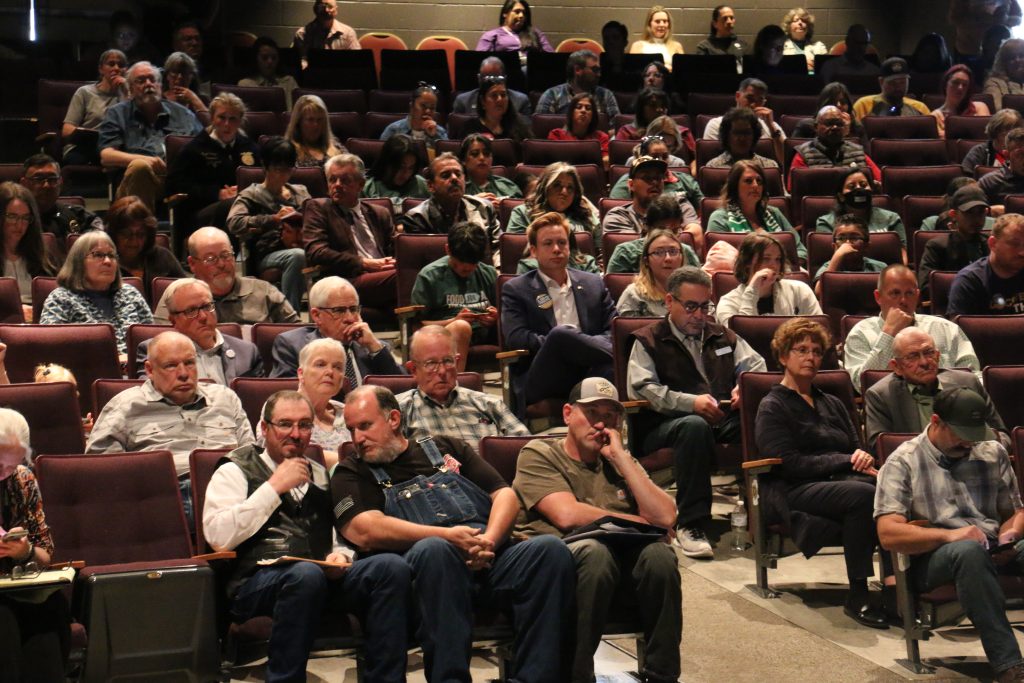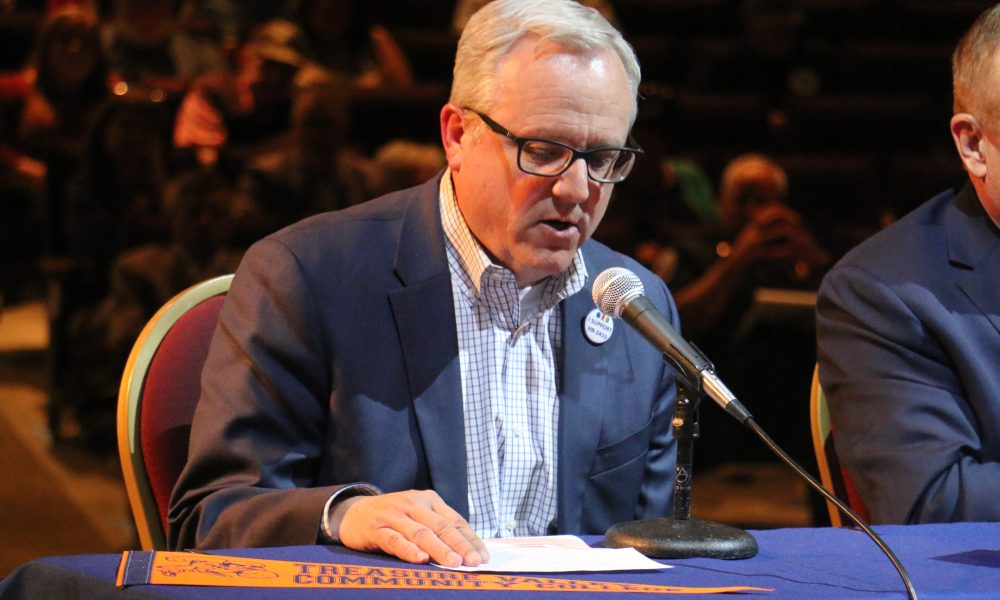ONTARIO – For two hours, legislators meeting in Ontario listened to rapid-fire requests for state money for issues ranging from water lines to wolves.
Speakers on Friday, April 28, had just two minutes to make their point, a digital clock ticking down their time. Many moved through scripted testimony at near double normal conversational pace to pack in as much as possible in 120 seconds.
They were addressing the Oregon Legislature’s Joint Ways and Means Committee, the powerful committee tasked with setting the state’s biennial budget. State senators and representatives assembled on the stage at the Meyer McLean Performing Arts Theater to listen. There were few empty seats in the 535-seat theater.
It was a rare opportunity for advocates to directly make a pitch for help without traveling to the Capitol in Salem or appearing remotely via a live broadcast. The session was carefully orchestrated, with groups of three seated at one time before legislators. Once an advocate spoke, they left, replaced quickly from the on-deck group waiting off-stage.
“We are the ones conducting street outreach and responding to unhoused complaints and incidents.”
–Ontario Police Chief Mike Iwai
By the end of the evening, 62 people addressed the legislators.
Not all members of the committee made the trip to Ontario, One legislator calculated that 11 of the 13 Democrats and four of the 10 Republicans on Ways and Means took part. Among those absent was state Rep. Greg Smith, R-Heppner.
State Sen. Elizabeth Steiner, D-Portland, one of two co-chairs, turned the meeting over to state Sen. Lynn Findley, R-Vale, at the start of the session. Steiner dubbed Findley the meeting’s “host.” Findley in turn introduced Dan Joyce, Malheur County Judge, to kick off the proceedings. Joyce welcomed the committee on its first visit to Ontario.
“This is not just a Malheur County meeting,” Findley said. “This is an eastern Oregon meeting.”

Those testifying came from Madras, Prineville, Pendleton and counties adjacent to Malheur County.
Food insecurity, education, law enforcement and funding for the Ontario Recreation Center and Treasure Valley Reload Center and other local projects came up.
Travis Johnson, Malheur County Sheriff, asked for more funding for community corrections, the county’s probation department. In the last budget cycle, Johnson said the county had to cut three positions while the number of people supervised went up significantly.
Johnson noted Ontario’s proximity to Idaho, where marijuana is still illegal and where recreational drug use has not been decriminalized as in Oregon. According to the sheriff, Malheur County is seeing more people from across the border to use drugs because they face fewer legal consequences. Johnson said that those who come over often commit other crimes to support their drug habits, such as theft and burglary.
Ontario Police Chief Michael Iwai testified that legislation designed to address the state’s homelessness problem doesn’t provide public safety funding.
Iwai said Oregon ranks last in the country regarding access to drug treatment and that most people who struggle with finding shelter also deal with mental illness and drug abuse. However, Iwai said that access to drug treatment and housing alone could not address Ontario’s homelessness. The needs more resources for public safety, he said.
“We are the ones conducting street outreach and responding to unhoused complaints and incidents,” Iwai said.
Iwai said t two groups to consider when addressing homelessness are those who want off the streets and those who wish to remain on the streets.
“Ontario specifically needs more funding to provide better services as a result of poor policy,” Iwai said. “Please help Ontario.”
Ron Jacobs, Malheur County commissioner, lobbied for the Malheur County Development Corp. request for an additional $8.5 million to complete the Treasure Valley Reload Center.
In March, the county, at the direction of Rep. Mark Owens and Findley, submitted an $8.5 million request to the state to rescue and complete the project.
Jacobs said he wasn’t involved when the state first funded the project in 2017. However, Jacobs said inflation and unexpected costs impaired the project.
Grant Kitamura, president of the development company building the rail center, also backed the $8.5 million request, saying onion shippers needed the rail service. On the education front, Dana Young, president of Treasure Valley Community College, urged passage of House Bill 5025. The legislation would provide more funding for community colleges and universities across Oregon.
Nickie Shira, a member of the Eastern Oregon Border Board, spoke in support of Senate Bill 531, which would add funding for after-school and summer school programs. Shira, who lives in Adrian, said Malheur County has the highest poverty rate among children in Oregon and that such programs would help underserved children.
Bartola Niebla, a resident of Malheur County, addressed the committee through an interpreter about food insecurity. Niebla, speaking in Spanish, said she had been working with communities lacking access to child care.
The state’s success, Niebla said, depends on how much access working families have to child care. However, Niebla said these communities need affordable choices for childcare outside of regular business hours.
“Just like roads and bridges are essential infrastructure for people to get to work,” Niebla said, “child care is one of these as well.
Vale Mayor Tom Vialpando, first speaker of the night, said the city needs state help for development. He said the city is anticipating 200 more connections to the city’s water source as the area sees more home construction. He said those connections are taking place on the city’s north end, but water pressure is at unsafe levels to support firefighting. “Additional water storage addresses the issue of water pressure and fire flow concerns,” Vialpando said.
Andrea Maeda, executive director of the Ontario Recreation District, asked legislators to support
House Bill 2410. That would help pay for construction of the Ontario Community Recreation Center.
To begin renovation of the old aquatic center, the district needs $2.4 million in hand to start the bidding process, Maeda said. The total price for the project is $6.4 million.
State funding would ensure the at-risk youth in the community would have a more positive path to follow in life, he said.
Maeda said local voters passed a transient occupancy tax to fund long-term maintenance and operations of the aquatic center.
“Our citizens have voted time and time again,” he said. “And they have shown their support in every possible way.”
John Kirby, Ontario city councilor, spoke on behalf of Senate Bill 70, legislation that would serve as a technical fix to previous legislation to open up more housing on marginal farmland in Malheur County. The legislation, expected to pass easily, instead has faced headwinds from land-use and environmental groups concerned about the loss of farm ground.
While in Malheur County, some legislators toured the Snake River Correctional Institution and an Ontario-based plant that is manufacturing concrete home parts with 3D printing.
On Saturday, April 29, the committee got a two-hour briefing on regional economic issues from Shawna Peterson, executive director of the Eastern Oregon Border Board.
NEWS TIP? Send an email to [email protected].
HOW TO SUBSCRIBE – The Malheur Enterprise delivers quality local journalism – fair and accurate. You can read it any hour, any day with a digital subscription. Read it on your phone, your Tablet, your home computer. Click subscribe – $7.50 a month.




